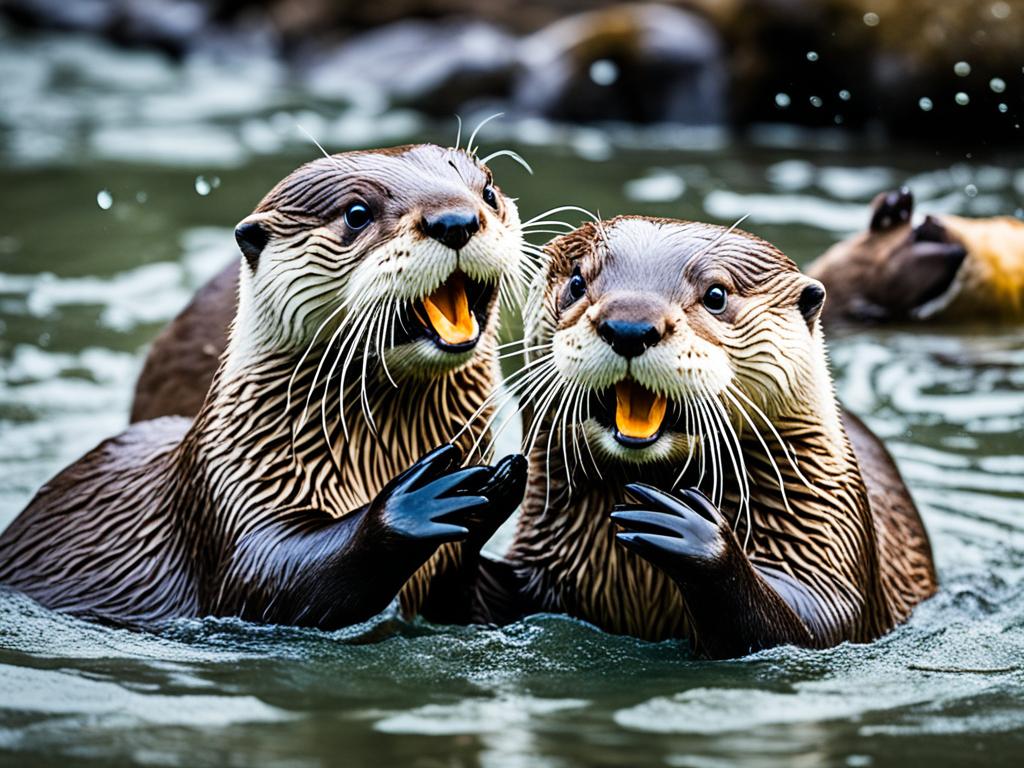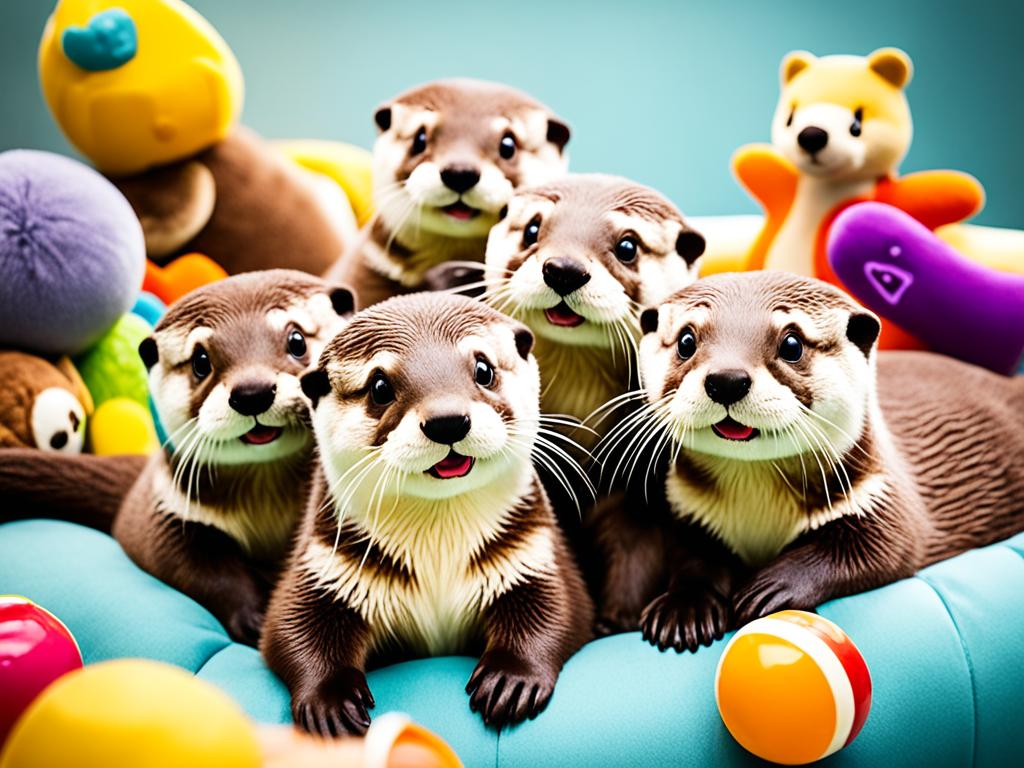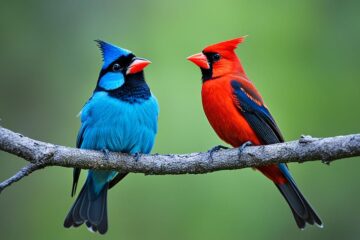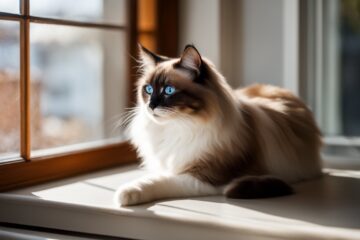Imagine coming home after a long day, feeling tired and stressed. As you step through the front door, you are greeted by a joyful squeak and the sight of a playful otter eagerly waiting to greet you. Instantly, your worries melt away as you immerse yourself in the warm embrace of your furry friend. Indeed, keeping otters as exotic pets can bring an abundance of love, joy, and wonder into your life.
For those daring souls who are captivated by the charm of these adorable creatures, the thought of having an otter as a pet may have crossed your mind. Their sleek fur, mischievous antics, and undeniable cuteness make them irresistible companions. But before diving into the world of otter ownership, it’s essential to understand the rewards and challenges that come along with it.
Key Takeaways:
- Keeping otters as exotic pets can provide immense love, joy, and wonder in your life.
- Before deciding to have an otter as a pet, understanding the challenges and responsibilities is crucial.
Otter Care: Meeting the Needs of Your Flippered Friend
Providing proper otter care is essential to ensure the well-being and happiness of your furry friend. This section explores the various aspects of otter care, including adoption, training, diet, and health care.
1. Otter Adoption
Adopting an otter requires careful consideration and research. Seek reputable otter breeders or rescue centers to ensure responsible and ethical adoption. Be prepared to provide a suitable habitat and meet the specific needs of the otter species you choose to adopt.
2. Proper Training
Training plays a crucial role in establishing a strong bond with your otter and ensuring their safety. Start training from a young age, using reward-based techniques to reinforce positive behaviors. Socialization and obedience training help otters adapt to domestic environments and interact with humans and other pets.
3. Nutritious Otter Diet
A well-balanced diet is vital for the health of your otter. Their diet consists of a variety of foods, including fish, amphibians, crustaceans, and invertebrates. Seek guidance from a veterinarian or otter care expert to develop a nutritious diet plan that meets the specific dietary requirements of your otter species.
4. Ensuring Otter Health Care
Maintaining the health of your otter involves regular veterinary check-ups and preventive care. Schedule routine vaccinations and deworming treatments to protect your otter from common diseases. It is crucial to provide proper dental care, hygiene, and environmental cleanliness to prevent health issues.
Remember, otters are wild animals and have specialized needs that require dedicated care and resources. Always consult with experts in otter care to ensure you can provide the necessary environment and attention they require.
By prioritizing otter care, including adoption, training, proper diet, and health care, you can create a loving and fulfilling relationship with your flippered friend. Invest time and effort into understanding the unique needs of otters to ensure their welfare and enjoyment in your care.
Creating the Perfect Otter Habitat
When it comes to keeping otters as pets, providing a suitable habitat is crucial to ensure their well-being and happiness. Creating the perfect otter habitat involves understanding their natural needs and replicating their natural environment as closely as possible.
First and foremost, water is essential for otters. They are semi-aquatic creatures, spending a significant amount of time in the water. Therefore, it’s important to provide a spacious and clean water source for your otter to swim, play, and dive in. A large pool or pond with a filtrating system will help maintain water quality and ensure a healthy habitat for your otter.
Enrichment activities play a vital role in keeping otters mentally stimulated and physically active. Otters are naturally curious and agile, so providing various toys, puzzles, and hiding spots in their habitat will keep them engaged and prevent boredom. Incorporating different textures and objects, such as rocks, logs, and tubes, can mimic their natural environment and stimulate their natural behaviors.
Space is another crucial factor to consider when designing an otter habitat. These playful creatures need ample room to roam, explore, and engage in social interactions. A spacious enclosure with both land and water areas will provide the necessary space for your otter to exhibit its natural behaviors.
“Creating an ideal otter habitat involves careful consideration of their needs for water, enrichment activities, and ample space. By replicating their natural environment, you can provide a fulfilling and stimulating habitat for your otter.”
Remember, safety is paramount when creating an otter habitat. Ensure that the enclosure is secure and escape-proof, and that any potential hazards are eliminated. Regular maintenance and cleaning of the habitat are also essential to ensure a clean and healthy living environment for your pet otter.
Ideal Components of an Otter Habitat
| Component | Description |
|---|---|
| Water Source | A spacious pool or pond with a filtrating system to maintain water quality. |
| Enrichment Activities | Various toys, puzzles, hiding spots, and natural objects to keep otters mentally stimulated and physically active. |
| Space | Adequate land and water areas to allow otters to roam, explore, and engage in social interactions. |
| Safety Measures | An escape-proof enclosure that eliminates potential hazards. |
| Maintenance | Regular cleaning and maintenance to ensure a clean and healthy living environment. |
By creating an ideal habitat that meets the otter’s physical, mental, and social needs, you can provide a nurturing and stimulating environment for your otter companion. Keep in mind that every otter is unique, and it’s important to observe their behavior and make adjustments to the habitat as needed to ensure their well-being.
Understanding Otter Behavior
When it comes to understanding otter behavior, these furry creatures never fail to amaze. Otters are known for their highly social nature and unique communication methods, making them fascinating animals to observe and interact with. Whether you’re a proud otter owner or simply interested in learning more about these curious creatures, exploring their behavior is key to building a strong bond with your furry friend.
Social Structure
At the heart of otter behavior lies their intricate social structure. Otters are highly social animals that live in groups called rafts. Within a raft, there is a clear hierarchy and division of labor. Alpha otters, usually the oldest and strongest, take charge and lead the group, while other members contribute to tasks such as hunting, grooming, and caring for the young. This social structure ensures cooperation and harmony within the raft, allowing otters to thrive in their natural habitats.
Communication Methods
Communication is vital among otters, and they employ various methods to convey messages to their fellow raft members. Vocalizations, such as chirping, squeaking, and trilling, are commonly used for social interaction, warning signals, or expressing distress. In addition to vocal cues, otters also communicate through body language, utilizing a variety of postures and gestures to convey their intentions and emotions. The ability to interpret these communication signals is crucial for otter owners to understand their pet’s needs and emotions.
Typical Behaviors
Observing the typical behaviors of otters provides valuable insight into their natural instincts and preferences. From playful sliding and diving in the water to grooming rituals and territorial marking, otters engage in a wide range of behaviors that define their unique personalities. Understanding these behaviors allows otter owners to create an environment that promotes physical and mental stimulation, ensuring their pet’s overall well-being.
“Otter behavior is a testament to their highly social nature and adaptable personalities. Whether they’re engaging in playful antics or diligently caring for their young, otters never cease to bring joy to those fortunate enough to observe their fascinating behaviors.” – Otter enthusiast

| Behavior | Description |
|---|---|
| Playful Sliding | Otters are known for their playful nature and enjoy sliding down slopes or into the water. This behavior helps them bond with other members of the raft and provides exercise and mental stimulation. |
| Grooming Rituals | Regular grooming is essential for otters to maintain their waterproof fur and remove dirt or parasites. They use their specialized forepaws to comb through their fur and ensure it remains clean and pristine. |
| Territorial Marking | By marking their territory with scent glands located near their tails, otters communicate ownership and assert dominance in their surroundings. This behavior is crucial for maintaining boundaries and preventing conflicts with other rafts. |
| Foraging and Hunting | As opportunistic hunters, otters showcase impressive fishing techniques, such as chasing and capturing prey underwater. Their dexterous paws and sharp claws enable them to catch fish, crustaceans, and other aquatic creatures with agility and precision. |
Unveiling the Otter’s Diet
Understanding the diet of otters is essential for their overall health and well-being. These charming creatures have specific dietary requirements that must be met to ensure their nutritional needs are fulfilled. Let’s take a closer look at what otters consume and how we can provide a balanced and nutritious diet for our pet otters.

Otters in the wild are opportunistic eaters, feasting on a wide range of aquatic prey. They have a remarkable ability to catch fish using their dexterous paws and sharp teeth. Fish, being their primary food source, contain essential nutrients and oils that ensure their coat remains thick and waterproof.
“Otters are natural hunters, skilled at capturing their underwater prey. Their diet reflects their adaptability and ability to thrive in various habitats.”
Aside from fish, otters also consume amphibians, small mammals, crustaceans, and even birds. Their diverse diet allows them to adapt to different environments and take advantage of available food sources.
When it comes to keeping pet otters, replicating their natural diet is crucial. A well-rounded diet should include a variety of protein sources. Feeding them a combination of fish, shellfish, insects, and even commercially available otter food helps ensure they receive the necessary nutrients.
Proper nutrition plays a significant role in the overall health of otters. It strengthens their immune system, enhances their energy levels, and promotes healthy growth and development. A balanced diet also contributes to their overall well-being and helps prevent health issues related to inadequate nutrition.
Feeding Recommendations
Feeding pet otters requires careful attention to their specific needs. Here are some feeding recommendations to promote a healthy diet for your flippered friend:
- Variety is key: Offer a diverse array of protein sources, including different types of fish, shellfish, and insects to ensure a well-rounded diet.
- Fresh is best: Serve fresh, high-quality food to meet their nutritional requirements and avoid potential health risks associated with spoiled or low-quality food.
- Supplements and vitamins: Consult with a veterinarian experienced in exotic pet care to determine if additional supplements or vitamins are necessary to support your otter’s specific needs.
- Hydration is essential: Provide ample fresh water for your otter to drink and play in. Remember, otters are aquatic creatures and require access to clean water at all times.
- Portion control: Monitor your otter’s food intake to prevent overfeeding or underfeeding. Obesity can lead to various health issues, while insufficient food can result in malnutrition.
By understanding the otter’s natural diet and implementing proper feeding practices, you can ensure that your otter receives the nutrition it needs to thrive. Remember, consult with a veterinarian to develop a tailored diet plan based on your otter’s age, size, and individual needs.
For more information on otter diets and their natural habitat, you can refer to this helpful resource.
Nurturing a Happy and Healthy Otter
Ensuring the well-being of your otter is paramount to fostering a strong and joyful bond. By taking proactive measures and providing proper otter health care, you can create an environment where your furry friend thrives.
Routine Health Checks
Regular veterinary visits are essential to monitor your otter’s overall health and detect any potential issues early on. A thorough examination by a qualified veterinarian should include assessing their body condition, teeth, ears, and eyes. It is also important to discuss any concerns or behavioral changes you may have noticed.
“Routine health checks are not only about addressing current issues but also about preventing future problems. By scheduling regular visits, you can stay on top of your otter’s well-being and receive professional guidance tailored to their specific needs.”
During these visits, your veterinarian may recommend vaccinations or preventative treatments to safeguard your otter against common diseases. They can also provide valuable advice on proper nutrition and offer guidance on creating a suitable habitat.
Potential Health Issues
While otters are typically hardy animals, certain health issues may arise. It’s important to be aware of the potential problems and take prompt action if any symptoms occur. Some common health concerns for otters include:
- Respiratory infections
- Parasitic infestations
- Dental issues
- Gastrointestinal problems
Monitoring your otter’s behavior, appetite, and physical appearance can help you identify any abnormalities. If you notice anything concerning, consult your veterinarian promptly for appropriate diagnosis and treatment.
Importance of Regular Veterinary Care
Veterinary care goes beyond addressing immediate health concerns. It plays a crucial role in preventive medicine, ensuring your otter’s long-term health and well-being. Regular check-ups, vaccinations, and dental care, along with parasite prevention, help maintain optimal health and reduce the risk of future complications.
“Investing in regular veterinary care for your otter is an investment in their overall quality of life. By prioritizing their health, you are setting the stage for many years of joy, companionship, and unforgettable moments together.”
Remember that the happiness and vitality of your otter greatly depend on their physical and mental well-being. By providing otter health care that encompasses routine health checks, awareness of potential issues, and regular veterinary care, you are ensuring a happy and healthy life for your otter.
Conclusion
In conclusion, keeping otters as exotic pets can be a unique and rewarding experience. Throughout this article, we have explored the joys of having a furry friend with flippers, from understanding their behavior to meeting their specific care needs.
However, it is important to remember that owning an otter comes with responsibilities and challenges. To ensure the well-being of your otter, it is crucial to provide a suitable habitat, offer a balanced diet, and prioritize their health care.
If you’re considering having an otter as a pet, be sure to educate yourself on the regulations and legal requirements in your area. Additionally, always consult with experts and professionals to ensure you are providing the best possible care for your otter companion.
To learn more about otters as pets and stay updated with the latest news and research in the field, visit https://animalstudies.msu.edu/news.php. Remember, providing a loving and enriching environment for your otter can result in a strong and lifelong bond with your fascinating flippered friend.




